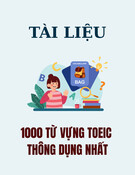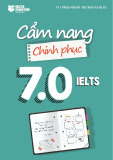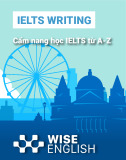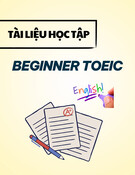
I. Mark the letter A,B,C,or D on your answer sheet to indicate the word that differs
from the rest in the position of the main stress in each of the following questions.
Question 1:
A. competition
B. residential
C. expectation
D. traditional
Question 2:
A. tennis
B. between
C. country
D. into
Question 3:
A. pretend
B. command
C. leisure
D. secure
Question 4:

A. marvellous
B. family
C. attractive
D. industry
Question 5:
A. discovery
B. difficulty
C. simplicity
D. commodity
II. Mark the letter A, B, C, D on your answe r sheet to indicate the sentence that is closest in
meaning to each of the following sentences.
Question 6: It is a basic requirement in the modern world to be able to deal with figures.
A. The world requires us to have a basic understanding of figures.
B. Being able to deal with figures is a basic requirement in the modern world.
C. Dealing with the modern world requires a basic knowledge of figures.
D. Dealing with figures requires a basic knowledge of the modern world.
Question 7: The way to get the best out of me is to make me work very hard.
A. Don't make me work hard or I can’t make the best out of me.
B. I work best when I am under pressure.
C. My work is under consideration, so I do my best.

D. If you make me work hard, I can't get the best.
Question 8: Their chances of success are small.
A. They have no chances of being successful.
B. It’s possible that they will achieve success.
C. They will certainly be successful.
D. It’s not very likely that they will succeed.
Question 9: I found myself at a loss to understand my closest friend’s words.
A. I found my closest friend's words quite incomprehensible.
B. I understood my closest friend’s words completely.
C. I lost heart and didn't understand my closest friend's words.
D.I found my closest friend's words easy to understand.
Question 10: “Be careful! Don't do that again,” he said.
A. He encouraged me to do that again.
B. He advised me to be careful and do that again.
C. He told me to be careful, so I didn't do that again.
D. He warned me not to do that again.

III.
Read the following passage and mark the letter A, B, C, or D on your ans wer sheet to indic
ate the correct answe r to each of the questions from 11 to 20.
For more than six million American children, coming home after school means coming back to
an empty house.Some deal with the situation by watching TV. Some may hide. But all of them
have something in common. They spend part of each day alone. They are called “latchkey
children”. They are children who look after themselves while their parents work. And their bad
condition has become a subject of concern.
Lynette Long was once the principal of an elementary school. She said, “We had a school rule
against wearing jewelry. A lot of kids have chains around their necks with keys attached. I was
constantly telling them to put the keys inside shirts. There were so many keys; it never came to
my mind what they meant.” Slowly, she learned that they were house keys.
She and her husband began talking to the children who had keys. They learned of the effect
working couples and single parents were having on their children. Fear was the biggest problem
faced by children at home alone. One in three latchkey children the Longs talked to reported
being frightened. Many had nightmares and were worried about their own safety.
The most common way latchkey children deal with their fear is by hiding. They may hide in a
shower tall, under a bed or in a closet. The second is TV. They often turn the volume up. It’s
hard to get statistics on latchkey children, the Longs have learned. Most parents are slow to
admit that they leave their children alone.
Question 11: The phrase “an e mpty house” in the passage mostly means ______.
A. a house with nothing inside
B. a house with no people inside

C. a house with too much space
D. a house with no furniture
Question 12: One thing that the children in the passage share is that ______.
A. they all watch TV
B. they all wear jewelry
C. they spend part of each day alone
D. they are from single-parent families
Question 13: The phrase “latchkey children” in the passage means children who ______.
A. look after themselves while their parents are not at home
B. close doors with keys and watch TV by themselves
C. are locked inside houses with latches and keys
D. like to carry latches and keys with them everywhere
Question 14: The main problem of latchkey children is that they ______.
A. watch too much television during the day
B. are growing in numbers
C. suffer a lot from being left alone
D. are also found in middle-class families

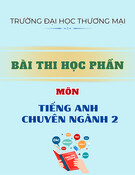
![Đề cương học phần Ứng dụng công nghệ thông tin trong giảng dạy ngoại ngữ (Application of Information Technology in Language Teaching) [Mới nhất]](https://cdn.tailieu.vn/images/document/thumbnail/2025/20250212/tuetuebinhan666/135x160/881739332468.jpg)
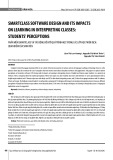

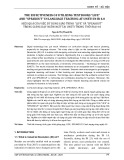





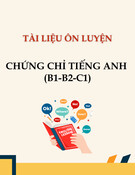
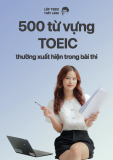
![Tài liệu luyện thi TOEIC cấp tốc trong 10 ngày [chuẩn nhất]](https://cdn.tailieu.vn/images/document/thumbnail/2025/20251029/kimphuong1001/135x160/99661761725822.jpg)
![Tài liệu Phá đảo TOEIC 900+ từ mất gốc trong 30 ngày [Mới nhất]](https://cdn.tailieu.vn/images/document/thumbnail/2025/20251029/kimphuong1001/135x160/2101761720956.jpg)




